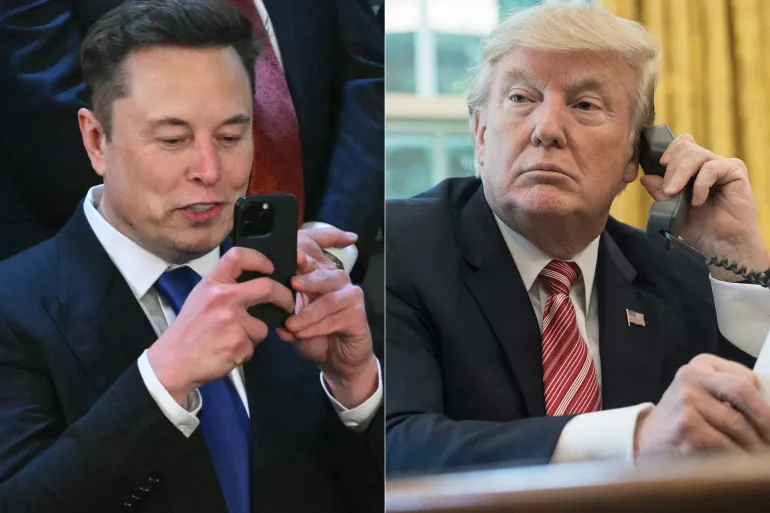Elon Musk, the world’s richest man and a key figure in President Donald Trump’s 2024 election victory, has sparked a political firestorm by threatening to form a new political party, tentatively called the “America Party.” This dramatic move comes in response to his growing frustration with Trump’s “Big Beautiful Bill,” a sweeping piece of legislation that has driven a wedge between the billionaire and the president. As the U.S. Senate debates the bill, Musk’s bold rhetoric and massive influence could reshape the political landscape. Here’s what’s at stake and why this feud matters.
A Public Falling-Out
Musk and Trump’s relationship, once a powerful alliance, has soured publicly in recent weeks. After spending record-breaking sums to support Trump’s campaign, Musk has expressed disappointment with the president’s latest legislative push. The “Big Beautiful Bill” proposes tax breaks and significant cuts to healthcare and food programs while increasing the national debt by an estimated $3.3 trillion over the next decade. Musk, a vocal critic of government spending, called the bill “insane” and a “DEBT SLAVERY bill” on his social media platform, X.
The tension escalated when Trump, speaking from the Oval Office on June 27, 2025, said he was “disappointed in Elon” and suggested Musk’s opposition stemmed from the bill’s elimination of electric vehicle credits. Trump also claimed he didn’t need Musk, stating, “I asked him to leave, I took away his EV Mandate… and he just went CRAZY!” Musk fired back on X, claiming, “Without me, Trump would have lost the election,” and accusing the president of “ingratitude.” This public spat has sent Tesla’s stock tumbling and raised questions about Musk’s next move.
The America Party: A New Vision?
Musk’s frustration with the Republican Party, which he accuses of betraying its promise to reduce government spending, has led him to propose a radical solution: a new political party. On June 30, 2025, Musk posted on X, “If this insane spending bill passes, the America Party will be formed the next day. Our country needs an alternative to the Democrat-Republican uniparty so that the people actually have a VOICE.” He argues that the bill, which raises the debt ceiling by a record $5 trillion, shows that both major parties are part of a “PORKY PIG PARTY” that prioritizes reckless spending over the interests of the American people.
Musk’s proposed America Party would aim to represent “the 80% in the middle,” a group he believes is ignored by the current two-party system. In a pointed message to Republicans, Musk wrote, “Trump has 3.5 years left as President, but I will be around for 40+ years,” signaling his long-term commitment to challenging the political status quo. He also threatened to use his vast financial resources to back primary challenges against GOP members who support the bill, specifically calling out House Freedom Caucus members Reps. Chip Roy and Andy Harris for their votes.
Why This Matters
Musk’s threat to launch a third party is more than just a publicity stunt. As the owner of X and a billionaire with unparalleled influence, he has the resources and platform to mobilize millions of followers. His role in building the GOP’s “big tent coalition” in 2024 makes his potential defection a nightmare for Republican operatives. A new party backed by Musk could split the conservative vote, weakening the GOP’s chances in future elections and giving Democrats an edge.
The bill itself is a lightning rod for controversy. It promises tax breaks but slashes funding for critical social programs, which critics argue will harm vulnerable Americans. Its projected $3.3 trillion addition to the national debt—already at $36 trillion—has drawn ire from fiscal conservatives like Musk. If passed, the bill could cement Musk’s resolve to break away from the GOP and launch his America Party, potentially reshaping American politics for decades.
Can Musk Pull It Off?
Creating a viable third party in the U.S. is no small feat. The two-party system is deeply entrenched, and third parties have historically struggled to gain traction. However, Musk’s wealth, influence, and control of X give him unique advantages. His ability to sway public opinion and fund campaigns could make the America Party a serious contender, especially if he taps into widespread frustration with both Republicans and Democrats.
Still, challenges abound. Musk would need to build a party infrastructure, attract credible candidates, and navigate complex election laws. His recent fallout with Trump could also alienate some of his conservative supporters, while his focus on fiscal conservatism might not resonate with voters who prioritize other issues. Despite these hurdles, Musk’s track record of disrupting industries—from electric vehicles to space travel—suggests he shouldn’t be underestimated.
What’s Next?
As the Senate moves closer to a vote on Trump’s bill, all eyes are on Musk. Will he follow through on his threat to form the America Party, or is this a strategic move to pressure Republicans into rejecting the bill? Either way, his feud with Trump and the GOP signals a deeper shift in the political landscape. For now, Musk’s message is clear: he’s ready to fight for his vision of America’s future, even if it means burning bridges with his former allies.








